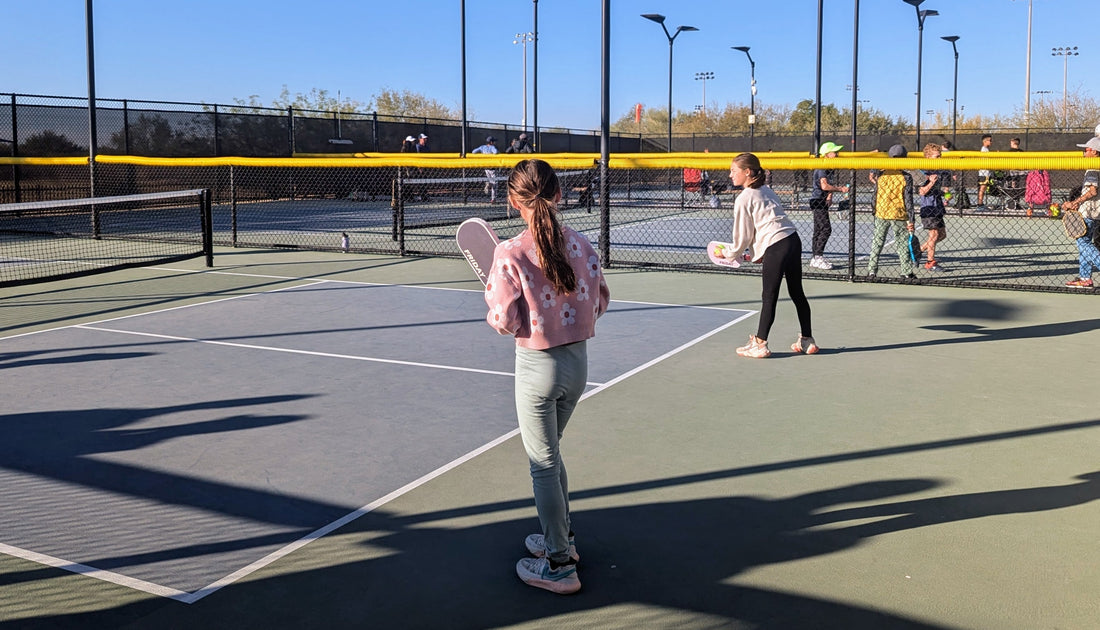
How to Teach Kids Good Sportsmanship
Share
We all want our kids to compete well.
But more than that—we want them to walk off the field with character, kindness, and courage. And that’s not always easy, especially when emotions are high, things feel unfair, or we want the win just as much as they do.
Recently, we had one of those moments. Our four oldest girls have been competing in youth pickleball and improving every time they play. At a recent tournament, one of our daughters was placed in the intermediate bracket—slightly above where she normally competes—but we knew she could handle the challenge.
During one of the pool play games, her team faced a pair that was clearly more advanced. The other team racked up points quickly, and it was obvious the win wasn’t going to be ours. Still, we were proud of how the girls kept showing up—playing hard and encouraging one another.
But then... the energy shifted.
A couple of missed referee calls stirred confusion. And the parents from the other team—who were still winning—became vocal, upset, and eventually, combative. Voices raised. Accusations flew. Tension thickened. And all of it happened with the kids watching.
I tried to help calm things down—reminding everyone that the ref was doing her best—but the response I got was, “Her best isn’t good enough.”
When the game finally ended, I asked our daughter how that experience was for her and something surprising happened.
She didn’t remember the score.
She remembered how she felt.
Confused. Uncomfortable. Sad. (her words)
Not because she lost—but because of the energy around her while she was trying her best. And this reminded me of a quote I once heard:
“You may not remember what someone said, but you’ll always remember how they made you feel.”
That moment stayed with me—not just as her dad, but as someone who’s been around sports my entire life. It reminded me how powerful our presence is as adults. How easily our tone, reactions, and expectations can shape a child’s experience—for better or worse.
And the truth is, we’ve all had those moments—on the sidelines, in the heat of the moment, saying things we didn’t mean or getting caught up in the pressure of it all. I’ve been there too. But it’s also why Kuyper Sports and this blog Raising Healthy Competitors exists. Because I need to grow and learn in these things just as much as anyone.
And because we believe there’s another way.
We believe sports can be a place where kids are challenged and supported, where they grow not just in skill, but in sportsmanship, character, and confidence.
So, how do we teach sportsmanship in a way that helps kids win and lose well?
Here are a few ways we’ve learned—through experience, mistakes, and everyday parenting—to help our kids win and lose well:
1. Redefine What Winning Means
If your child thinks winning is everything, losing will always feel like failure.
Try shifting your language with questions like:
- “Did you try your best?”
- “What’s something you’re proud of?”
- “How did you treat others today?”
- “What’s something you learned through playing today?”
Questions like these put the focus on the effort made, not the outcome and it’s this kind of conversation that allows our kids to think bigger and deeper beyond what the scoreboard says.
2. Let Them Lose (And Feel It)
Let them cry. Let them feel disappointed. And be there with them in it. It might be one of the hardest things to do as a parent, but that’s exactly how resilience grows. The quick fixes of making them feel better in the moment or telling them to “be tough” robs them of an opportunity to grow through the inevitable moments that don’t go our way. And as a parent who wants kids to grow into healthy humans, learning to let them sit in these moments while being right next to them through it is so important.
Saying things like this are helpful for when you find yourself there:
- “That was tough, and I’m proud of you for showing up.”
- “You were so brave to try.”
-
“I saw how hard you worked out there, that was amazing.”
3. Celebrate the Other Team
Even when it stings. Teach your child to clap for others. To say "good game" and mean it. It not only shows strength, but also heart for other kids who are competing just as hard. It may be countercultural, but showing our kids how we can celebrate others even when things don’t go our way builds character that will last far beyond the game.
4. Praise Character, Not Just Performance
Instead of saying “You crushed it,” try:
- “You encouraged your teammates today, that was awesome.”
- “I loved how you kept going, even when it was hard.”
- “I saw how you fought through that hard moment when you really wanted to give up, that was so courageous!”
5. Model the Kind of Competitor You Want to Raise
This one’s the hardest—and the most powerful.
How we respond (to refs, coaches, other parents) shapes how our kids learn to respond.
We all lose our cool sometimes. But let’s keep showing up, humbly and consistently, as parents who are growing too.
What Kuyper Sports Is All About
At Kuyper Sports, we’re doing things differently.
We’re here to change the tone of youth sports and competing in general.
To create environments where competition is healthy, voices are kind, and kids walk away feeling seen—not just scored.
Whether your child is just beginning or already deep into competition, our in person summer sports camps create space for them to grow—not just as athletes, but as people.
Explore our camps + register here
Because the goal isn't about just winning a game.
It’s who they’re becoming while they play.
